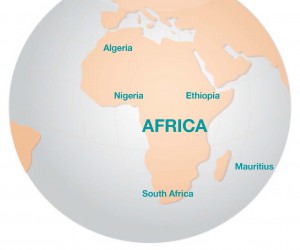Africa is currently the world’s second fastest growing economy. This growth has been achieved in the face of substantial challenges such as international financial market turmoil, infrastructure constraints and chronic skills shortages. But what has the role of the public sector been in driving this exceptional growth, and are recent developments sustainable in light of government action in Algeria, Nigeria, Ethiopia, South Africa and Mauritius.
The Growth Innovation Leadership (GIL 2013: Africa) event on 15 August at the Table Bay Hotel in Cape Town, will be looking at high impact strategies employed by government to create a conducive business environment and stimulate economic growth.
The recent Frost & Sullivan’s Global Public Sector Survey (2013) revealed that 32% of government officials interviewed see impact assessments measuring the effectiveness of policy implementation as their most pressing policy related concern; while 22% believe that the effectiveness of policy implementation deserves top priority and only 18% see new policy formulation as the critical hurdle. In response to a separate question, 19.3% of respondents believe that improved coordination with other levels of government will yield the greatest impact on the workings of a government, while 18.8% look towards the adoption of technological innovation, and 14.4% point to the development of a customer-centric approach to the delivery of civil service.
Key African countries, like Algeria, Nigeria, Ethiopia, South Africa and Mauritius are making steady strides through the design and implementation of national growth strategies, and responsive governance. “Through continuous emphasis placed on improved market and business sophistication, Mauritius is on its way to becoming one of the top ten most business friendly locations in the world; while Ethiopia achieved its status as the twelfth fastest growing economy globally in 2012 and could reach middle-income status by 2015, if it sustains its historic growth rate. This was achieved through its intense public investment rate - which is the third highest in the world - estimated at 25% of GDP in 2012,” according to Adri Grobler, Head of the Public Sector Division at Frost & Sullivan.
South Africa, which was ranked 52nd for global competitiveness, aims for further improvement in this regard through economic diversification driven by targeted policy support and industrial financing. The Industrial Policy Action Plan (IPAP), for example, aims to systematically support sectors in distress, develop qualitative new areas of focus as well as sectors that could become areas of competitive advantage in the longer term.
Social and institutional development is also fast becoming a priority for governments in Africa. Nigeria aims to strengthen public institutions and promote legitimacy. Algeria is devoting $114 billion (an enormous 40% of the resources made available via its Public Investment Plan 2010-2014) to human development (including health, education, housing, and water and sanitation) and a further 40% ($114 billion) on maintaining the national economic growth, specifically in infrastructure development and the improvement of the public sector.
“With the considerable growth in Africa, the challenge for the public sector will be to maintain strong and sustainable gains in recent development through responsive measures and the implementation of innovative strategies,” says Grobler.
- Frost & Sullivan's Global GIL Community continues to be the industry's only resource that supports CEOs and their management teams in critical decision-making, offering tools that help industry leaders in achieving the three essential objectives of Growth, Innovation and Leadership. GIL 2013: Africa will provide CEOs and their growth teams an opportunity not just to attend GIL, but to actually experience it.






